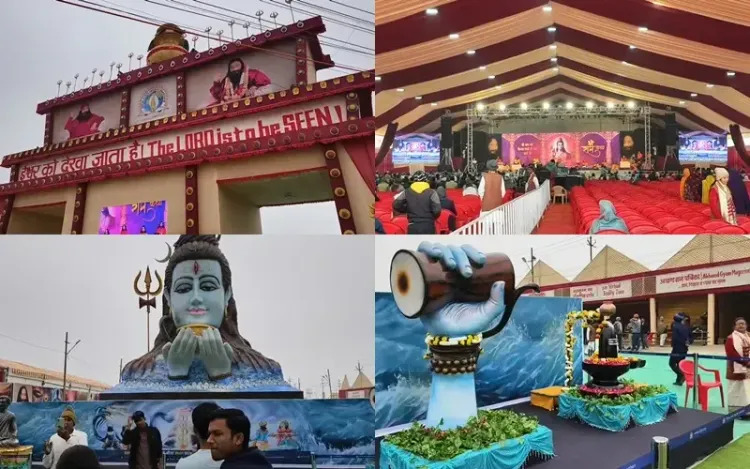Sustainable Pandals Set New Standard at Kumbh Mela

Synopsis
Key Takeaways
- Eco-friendly pandals made from sustainable materials.
- Elimination of single-use plastics and PVC.
- Handcrafted artwork by international artisans.
- Over 60 eco-friendly cottages built within the camp.
- Alignment with government sustainability initiatives.
New Delhi, Jan 18 (NationPress) A 'green' camp at the ongoing Maha Kumbh Mela in Prayagraj has emerged as a significant attraction, not just for its spiritual and cultural activities but also for its extraordinary dedication to sustainability and plastic-free pandals.
Located in Sector 9, close to Gangeshwar Bajrangdas Chowk, this 9-acre Divya Jyoti Jagriti Sansthan's camp is hosting a 33-day festival of spirituality and culture, which will continue from January 15 to February 16. Attendees are enjoying a stunning mix of divinity, culture, and contemporary technology, all with an eco-friendly perspective.
The camp covers over 9 acres, with boundaries measuring 400 x 750 feet. One of its most impressive aspects is the collection of 16 handcrafted paintings produced by international artists, spearheaded by Krishna Pal and his team. These artworks, showcased throughout the camp, utilize eco-friendly materials. A standout feature of this initiative is the complete elimination of single-use plastics and PVC.
The entire pandal is crafted with sustainability at its core, employing materials such as jute, grass, and fabric. More than 60 eco-friendly cottages have been erected within the camp, ensuring that every component of the structure aligns with the principles of environmental conservation.
Ruchika Bharti, a representative of Divya Jyoti Sansthan, underscored the significance of environmental accountability in accordance with the government’s sustainability campaign. “In line with the government's environmental initiative, we are also playing our part to ensure a green Kumbh. Our camp is entirely plastic-free. Even the flex used for decorations is made from jute, and materials like grass and til (sesame) are being utilized. This initiative aims to foster a plastic-free environment here at the Maha Kumbh,” she stated.
Ruchika further stressed that the organization’s endeavors resonate with the belief that a harmonious relationship with nature is crucial for human advancement.
“We firmly believe that without nature, nothing is achievable. Safeguarding our environment is vital for humanity to flourish, and this Green Kumbh initiative is a way to contribute to that purpose,” she added.
This eco-friendly initiative at Maha Kumbh is capturing considerable attention from both visitors and officials, establishing a new standard for how large-scale events can adopt sustainability.










